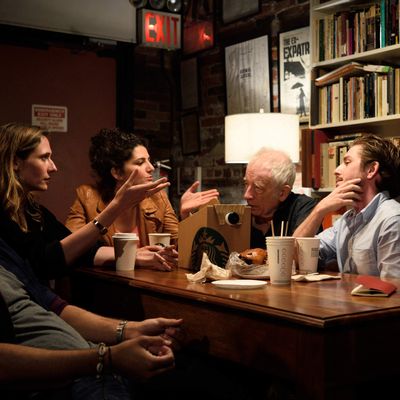
In the cramped backstage space behind the seating bank at the tiny HB Playwrights Theatre in the West Village, playwright Torrey Townsend is ripping the American Theater a new one. ItÔÇÖs the kind of raw, audacious evisceration that only someone who truly loves the messy, awful (in all senses) art of the stage could perform. If you see as much potential for transcendence in theater as Townsend does, then you probably also sense its seemingly bottomless capacity for narcissism, pettiness, and bullshit. Fortunately for those of us in the audience at TownsendÔÇÖs intimate new play The Workshop, this combustion of frustration and exhilaration makes for one hell of an evening of theater.
Directed with a deft and unaffected hand by Knud Adams and featuring a shattering central performance by Austin Pendleton, The Workshop takes us through several sessions of a playwriting class at an unidentified New York Citybased graduate program. Townsend himself earned his MFA in playwriting from Columbia in 2013, so the subject matter is  close to home. Leading the workshop of the title is Ward Stein (Pendleton), a 76-year-old playwright who won an Obie in 1979 and now holds forth on a weekly basis to a small coterie of rapt young writers. Between readings of their work, Ward reminisces about how he fixed the ending of Glengarry Glen Ross for David Mamet, or bemoans his students ignorance of the Western theatrical canon (HAVE YOU EVEN FUCKING READ DEATH OF A SALESMAN?), or gnashes his teeth at various well-known critics (he wears his bad reviews, which he has memorized to the syllable, like Saint Sebastian stuck full of arrows).
If this is making Ward sound insufferable, he is. And then he isnÔÇÖt. And then he is again. Townsend wonÔÇÖt let us settle on an easy judgment of his protagonist. Every time we feel swept along by WardÔÇÖs fierce, articulate love of his art form, our admiration for him sours as he slips into a bout of name-dropping or sarcastic dejection. But every time weÔÇÖre ready to write him off, he transcends himself again, revealing the capacity for something visionary. The Workshop is a breathtaking study of an Ego: passionate, eloquent, and full of deep, fiery intelligence ÔÇö and also full of bitterness and wounded pride, solipsism, ugliness, and cruelty.
Townsend has created a protagonist that springs from a long lineage of suffering, self-aggrandizing male egos, from Lear to Willy Loman, and Austin Pendleton is heartbreaking in the part. The veteran actor works gently, inhabiting TownsendÔÇÖs ultracasual contemporary rhythms with a lightness that sets off the characterÔÇÖs periodic outbursts ÔÇö when they come, they knock the air out of you. The approach is equal parts sympathetic and merciless: Ward is a tangled mess of pretensions and vulnerability, and Pendleton makes us see both his ability to be great and his tendency to be small. But Ward is also more than a thrilling challenge for an actor: He is a symbol for How We Got Here, for the personalities and the fixations that have created this troublesome beast we call the American Theater.
There he is, a 76-year-old white man who believes he never got his due, standing at the head of a classroom and lamenting his studentsÔÇÖ ignorance of the theatrical canon ÔÇö that is, the canon of other white men. As Ward sings the praises of Tolstoy and Eugene OÔÇÖNeill, Lanford Wilson and Sean OÔÇÖCasey, his prot├®g├®s furiously take notes in their Moleskines, trying not to miss a word. ThereÔÇÖs Ward again, talking over the only student of color in his class (Cesar J. Rosado as Zorick, the most genuinely good-natured of the bunch), or staring glassy-eyed at the beautiful Kris (Claire Siebers, as the student who gets in over her head with her teacher). And there he is unleashing the full tempest of his fury on the other woman in the class, Lili (Laura Lassy Townsend), whose attempts to write a musical that draws on her personal demons send Ward into a paroxysm of disgust. As he demands that the students tell him the difference between the genius of Dostoevsky or Eugene OÔÇÖNeill and the ÔÇ£pathetic self-congratulatory claptrapÔÇØ that Lili has written, itÔÇÖs all too clear that heÔÇÖs not asking them why Lili is no OÔÇÖNeill. HeÔÇÖs asking why he isnÔÇÖt. Why didnÔÇÖt Fortune smile upon Ward Stein, hold him to her bosom, and reveal his genius to the world?
But hereÔÇÖs the thing: Dostoevsky and Eugene OÔÇÖNeill are worth rhapsodizing over. Zorick is a good dude but fails to bring in even the ÔÇ£beat sheetÔÇØ heÔÇÖs been working on to share with the class. And LiliÔÇÖs musical is crap. These are the things that make you wince ÔÇö in the best way ÔÇö as you watch The Workshop, because they ring not with the soothing harmony of how weÔÇÖd like for people to be, but with the icky, complicated discord of how they are. We want to despise the Ward Steins of the world ÔÇö consigning them to the ideological dumpster makes us feel better about ourselves. ItÔÇÖs harder to admit that they, like each of us, contain multitudes, that they might have something to teach as well as a staggering amount to learn. The uncomfortable brilliance of The Workshop is that it wonÔÇÖt let us pat ourselves on the back. Townsend is questioning the automatic authority that Ward and those that look, sound, and write like him are afforded in their opinions ÔÇö they are creating the syllabus and they are they syllabus ÔÇöand he is probing the ways in which inspiration and toxicity can exist within the same body. That body is WardÔÇÖs, but itÔÇÖs also the body of our contemporary theater.
The Workshop is at the HB Playwrights Theatre through August 13.


